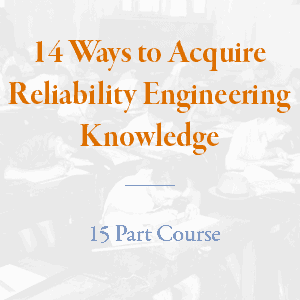 Maria Popova recently wrote about the work of James T. Mangan and his book You Can Do Anything!
Maria Popova recently wrote about the work of James T. Mangan and his book You Can Do Anything!, published in 1936. In particular Maria focused on one section titled “14 Ways to Acquire Knowledge”, one lesson per week.
The article is about learning anything, which made me think about how to learn reliability engineering. So, without apology, let’s explore 14 ways to learn about reliability engineering.
[hide_from visible_to=”public”]Please login to have full access.
[login-form redirect=”https://fred-schenkelberg-project.prev01.rmkr.net/14-ways-acquire-reliability-engineering-knowledge/”]
[password-recovery-link text=’Lost Password? Click here to have it emailed to you.’]
If you haven’t registered, it’s free and takes only a moment.
[/hide_from][hide_from accesslevel=”14warek”][show_to accesslevel=”free”]
Thanks for being a member [member_first_name]!
To view this free member’s only course, click
Start Course
[/show_to][/hide_from][show_to accesslevel=”14warek”]
Enjoy the Course — select available lessons via the menu to the right (note: You will receive an email weekly as each lesson becomes available.)
[/show_to]
Reliability engineering is a broad field and its practitioners must have the ability to learn constantly. There is no best way to master a subject. Combining learning approaches will help you accelerate your mastery of the subject.
This course explores 14 ways to learn reliability engineering. This applies to learning about specific tools such as failure modes and effects analysis or highly accelerated life testing, as well as learning how to create a reliability program or assess a supplier’s reliability program.
Reliability engineering is an acquired set of skills and knowledge.
The combination of formal education, seminars, conferences, and other deliberate actions to acquire knowledge allows one to learn and apply the appropriate skills. Refining how learning occurs and identifying learning opportunities enable mastery in the field of reliability engineering. This course provides a starting point for your professional development planning and provides a few new ways to consider how to learn.
[hide_from accesslevel=”14warek”][show_to accesslevel=”free”]
Thanks for being a member [member_first_name]!
To view this free member’s only course, click
Start Course
[/show_to][/hide_from]
 Ask a question or send along a comment.
Please login to view and use the contact form.
Ask a question or send along a comment.
Please login to view and use the contact form.